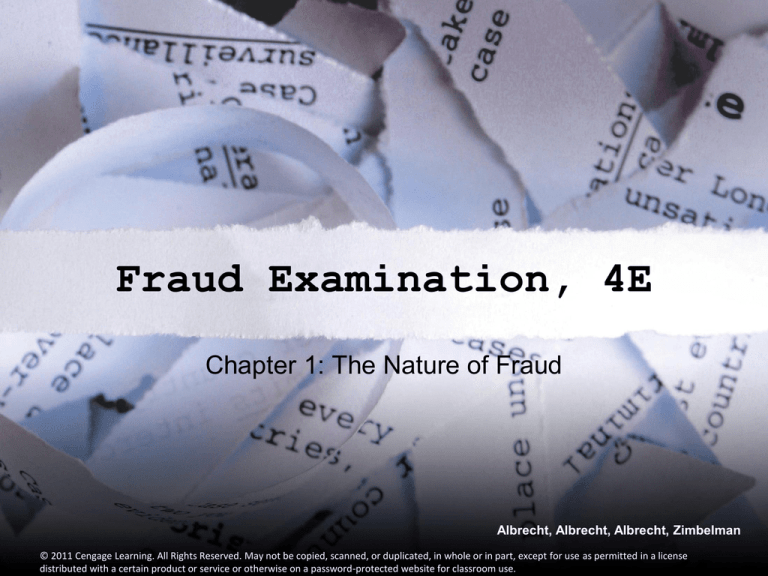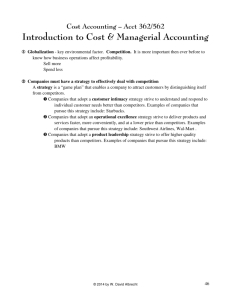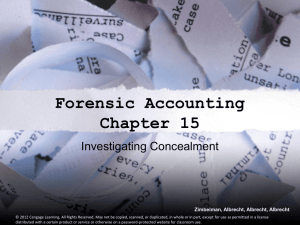
Fraud Examination, 4E
Chapter 1: The Nature of Fraud
Albrecht, Albrecht, Albrecht, Zimbelman
© 2011 Cengage Learning. All Rights Reserved. May not be copied, scanned, or duplicated, in whole or in part, except for use as permitted in a license
distributed with a certain product or service or otherwise on a password-protected website for classroom use.
Learning Objectives
Understand the seriousness of fraud and how
fraud affects individuals, consumers,
organizations, and society.
Define fraud.
Understand the different types of fraud.
Understand the difference between fraud
committed against an organization on behalf of
an organization.
Understand the difference between criminal and
civil fraud laws.
Albrecht, Albrecht, Albrecht, Zimbelman
© 2011 Cengage Learning. All Rights Reserved. May not be copied, scanned, or duplicated, in whole or in part, except for use as permitted in a license
distributed with a certain product or service or otherwise on a password-protected website for classroom use.
Learning Objectives
Understand the types of fraud-fighting careers
available today.
Albrecht, Albrecht, Albrecht, Zimbelman
© 2011 Cengage Learning. All Rights Reserved. May not be copied, scanned, or duplicated, in whole or in part, except for use as permitted in a license
Introduction to Fraud
Albrecht, Albrecht, Albrecht, Zimbelman
© 2011 Cengage Learning. All Rights Reserved. May not be copied, scanned, or duplicated, in whole or in part, except for use as permitted in a license
Sources of Fraud Statistics
Four Basic Sources
Government Agencies
Researchers
Insurance Companies
Victims of Fraud
Albrecht, Albrecht, Albrecht, Zimbelman
© 2011 Cengage Learning. All Rights Reserved. May not be copied, scanned, or duplicated, in whole or in part, except for use as permitted in a license
distributed with a certain product or service or otherwise on a password-protected website for classroom use.
The Seriousness of Fraud
U.S. organizations lose seven percent of annual
revenues to fraud
Applied to the estimated 2008 U.S. GDP, this seven
percent translates to approximately $994 billion in
losses
Fraud affects how much we pay for goods and services,
each of us pays not only a portion of the fraud bill but
also for the detection and investigation of fraud
Losses incurred from fraud reduce a firm’s income on a
dollar-for-dollar basis
Albrecht, Albrecht, Albrecht, Zimbelman
© 2011 Cengage Learning. All Rights Reserved. May not be copied, scanned, or duplicated, in whole or in part, except for use as permitted in a license
distributed with a certain product or service or otherwise on a password-protected website for classroom use.
The Seriousness of Fraud
For every $1 of fraud,
net income is reduced
by $1
It takes more revenue
to recover the effects
of the fraud, since
fraud reduces the net
income
Albrecht, Albrecht, Albrecht, Zimbelman
© 2011 Cengage Learning. All Rights Reserved. May not be copied, scanned, or duplicated, in whole or in part, except for use as permitted in a license
distributed with a certain product or service or otherwise on a password-protected website for classroom use.
What is Fraud?
Albrecht, Albrecht, Albrecht, Zimbelman
© 2011 Cengage Learning. All Rights Reserved. May not be copied, scanned, or duplicated, in whole or in part, except for use as permitted in a license
distributed with a certain product or service or otherwise on a password-protected website for classroom use.
What is Fraud?
Seven Specific Parts of Fraud
1.
2.
3.
4.
5.
6.
7.
a representation
about a material point
which is false
and intentionally or recklessly so
which is believed
and acted upon by the victim
to the victim’s damage
Albrecht, Albrecht, Albrecht, Zimbelman
© 2011 Cengage Learning. All Rights Reserved. May not be copied, scanned, or duplicated, in whole or in part, except for use as permitted in a license
distributed with a certain product or service or otherwise on a password-protected website for classroom use.
What is Fraud?
• Fraud is…
• intentional
• to trick or deceive
someone out of
his/her assets
• theft
• a crime
• Fraud is not…
• taken by physical
force
• a mistake or error
• victimless
• insignificant because
no one is hurt
• acceptable or
justifiable
Albrecht, Albrecht, Albrecht, Zimbelman
© 2011 Cengage Learning. All Rights Reserved. May not be copied, scanned, or duplicated, in whole or in part, except for use as permitted in a license
distributed with a certain product or service or otherwise on a password-protected website for classroom use.
The Various
Classifications of Fraud
The Two General
Classifications
Committed against an
organization
Committed on behalf
of an organization
Albrecht, Albrecht, Albrecht, Zimbelman
© 2011 Cengage Learning. All Rights Reserved. May not be copied, scanned, or duplicated, in whole or in part, except for use as permitted in a license
distributed with a certain product or service or otherwise on a password-protected website for classroom use.
The Various
Classifications of Fraud
Occupational Fraud
Occupational fraud is the use of one’s occupation for
personnel enrichment through the deliberate misuse or
misapplication of the employing organization’s resources
or assets.
Albrecht, Albrecht, Albrecht, Zimbelman
© 2011 Cengage Learning. All Rights Reserved. May not be copied, scanned, or duplicated, in whole or in part, except for use as permitted in a license
distributed with a certain product or service or otherwise on a password-protected website for classroom use.
The Various
Classifications of Fraud
With occupational fraud, the activity…
is clandestine
violates the employee’s obligations to the
organization
is for direct or indirect financial benefit
costs the organization assets, revenues, or
reserves
Albrecht, Albrecht, Albrecht, Zimbelman
© 2011 Cengage Learning. All Rights Reserved. May not be copied, scanned, or duplicated, in whole or in part, except for use as permitted in a license
distributed with a certain product or service or otherwise on a password-protected website for classroom use.
Classifications
of Occupational Fraud
Asset
misappropriations
Corruption
Fraudulent
statements
Albrecht, Albrecht, Albrecht, Zimbelman
© 2011 Cengage Learning. All Rights Reserved. May not be copied, scanned, or duplicated, in whole or in part, except for use as permitted in a license
distributed with a certain product or service or otherwise on a password-protected website for classroom use.
The Various
Classifications of Fraud
Fraud classification according to victims:
Company or Organization as victim
Employee embezzlement
Vendor fraud
Customer fraud
Shareholders or debt-holders as victims
Management fraud
Unwary individuals as victims
Investment and other consumer fraud
Anyone as a victim
Miscellaneous fraud
Albrecht, Albrecht, Albrecht, Zimbelman
© 2011 Cengage Learning. All Rights Reserved. May not be copied, scanned, or duplicated, in whole or in part, except for use as permitted in a license
distributed with a certain product or service or otherwise on a password-protected website for classroom use.
The Various
Classifications of Fraud
Employee Embezzlement
Occupational fraud (most common)
Employees steal company assets
Is direct or indirect
Direct: employee directly steals company cash, inventory,
tools, supplies, or other assets
Indirect: employee takes bribes or kickbacks from vendors,
customers, or others for lower sales prices, higher purchase
prices, nondelivery of goods, or the delivery of inferior goods
Example: CVC Construction (direct)
Albrecht, Albrecht, Albrecht, Zimbelman
© 2011 Cengage Learning. All Rights Reserved. May not be copied, scanned, or duplicated, in whole or in part, except for use as permitted in a license
distributed with a certain product or service or otherwise on a password-protected website for classroom use.
The Various
Classifications of Fraud
Vendor Fraud
Two main varieties:
through vendors alone
through collusion between buyers and vendors
Usually results in:
overcharge for purchased goods
shipment of inferior goods
Nonshipment of purchased goods
Example: Halliburton
Albrecht, Albrecht, Albrecht, Zimbelman
© 2011 Cengage Learning. All Rights Reserved. May not be copied, scanned, or duplicated, in whole or in part, except for use as permitted in a license
distributed with a certain product or service or otherwise on a password-protected website for classroom use.
The Various
Classifications of Fraud
Customer Fraud
When customers
do not pay for goods
get something for nothing
deceive organizations into giving them something
they should not have
Example: Chicago bank
Albrecht, Albrecht, Albrecht, Zimbelman
© 2011 Cengage Learning. All Rights Reserved. May not be copied, scanned, or duplicated, in whole or in part, except for use as permitted in a license
distributed with a certain product or service or otherwise on a password-protected website for classroom use.
The Various
Classifications of Fraud
Management Fraud
Also known as
financial statement
fraud
top management
deceptively misstates
financial statements
Examples:
Enron
WorldCom
Sunbeam
Albrecht, Albrecht, Albrecht, Zimbelman
© 2011 Cengage Learning. All Rights Reserved. May not be copied, scanned, or duplicated, in whole or in part, except for use as permitted in a license
distributed with a certain product or service or otherwise on a password-protected website for classroom use.
The Various
Classifications of Fraud
Investment and Other Consumer Fraud
Worthless investments sold to investors
Examples:
Ponzi schemes
Telemarketing fraud
Nigerian letter or money scams
Identity theft
Advance fee scams
Redemption/strawman/bond fraud
Letter of credit fraud
Internet fraud
Albrecht, Albrecht, Albrecht, Zimbelman
© 2011 Cengage Learning. All Rights Reserved. May not be copied, scanned, or duplicated, in whole or in part, except for use as permitted in a license
distributed with a certain product or service or otherwise on a password-protected website for classroom use.
The Various
Classifications of Fraud
Albrecht, Albrecht, Albrecht, Zimbelman
© 2011 Cengage Learning. All Rights Reserved. May not be copied, scanned, or duplicated, in whole or in part, except for use as permitted in a license
distributed with a certain product or service or otherwise on a password-protected website for classroom use.
Criminal and Civil
Fraud Laws
Albrecht, Albrecht, Albrecht, Zimbelman
© 2011 Cengage Learning. All Rights Reserved. May not be copied, scanned, or duplicated, in whole or in part, except for use as permitted in a license
distributed with a certain product or service or otherwise on a password-protected website for classroom use.
Prepare for a
Fraud-fighting Career
Skills for Fraud-Fighting Professionals
Analytical Skills
examine data for symptoms of fraud
Communication Skills
effectively interview witnesses and suspects
communicate findings to witnesses, courts and
others
Technological Skills
search for fraud by effectively using information
systems
Albrecht, Albrecht, Albrecht, Zimbelman
© 2011 Cengage Learning. All Rights Reserved. May not be copied, scanned, or duplicated, in whole or in part, except for use as permitted in a license
distributed with a certain product or service or otherwise on a password-protected website for classroom use.
Prepare for a
Fraud-fighting Career
More Skills for a Fraud-Fighting Professional
Some understanding of accounting and business
A knowledge of civil and criminal laws, criminology,
privacy issues, employee rights, fraud statutes, and
other legal fraud-related issues
The ability to speak and write in a foreign language
A knowledge of human behavior
Albrecht, Albrecht, Albrecht, Zimbelman
© 2011 Cengage Learning. All Rights Reserved. May not be copied, scanned, or duplicated, in whole or in part, except for use as permitted in a license
distributed with a certain product or service or otherwise on a password-protected website for classroom use.
Become a Certified
Fraud Examiner
Be an associate member of the ACFE in good
standing
Meet minimum academic and professional
requirements:
Bachelor’s Degree
Two years of professional experience directly or
indirectly related to fraud examination
Be of high moral character
Agree to abide by the Bylaws and Code of
Professional Ethics of the ACFE
Albrecht, Albrecht, Albrecht, Zimbelman
© 2011 Cengage Learning. All Rights Reserved. May not be copied, scanned, or duplicated, in whole or in part, except for use as permitted in a license
distributed with a certain product or service or otherwise on a password-protected website for classroom use.
Fraud-fighting Careers
Albrecht, Albrecht, Albrecht, Zimbelman
© 2011 Cengage Learning. All Rights Reserved. May not be copied, scanned, or duplicated, in whole or in part, except for use as permitted in a license
distributed with a certain product or service or otherwise on a password-protected website for classroom use.






